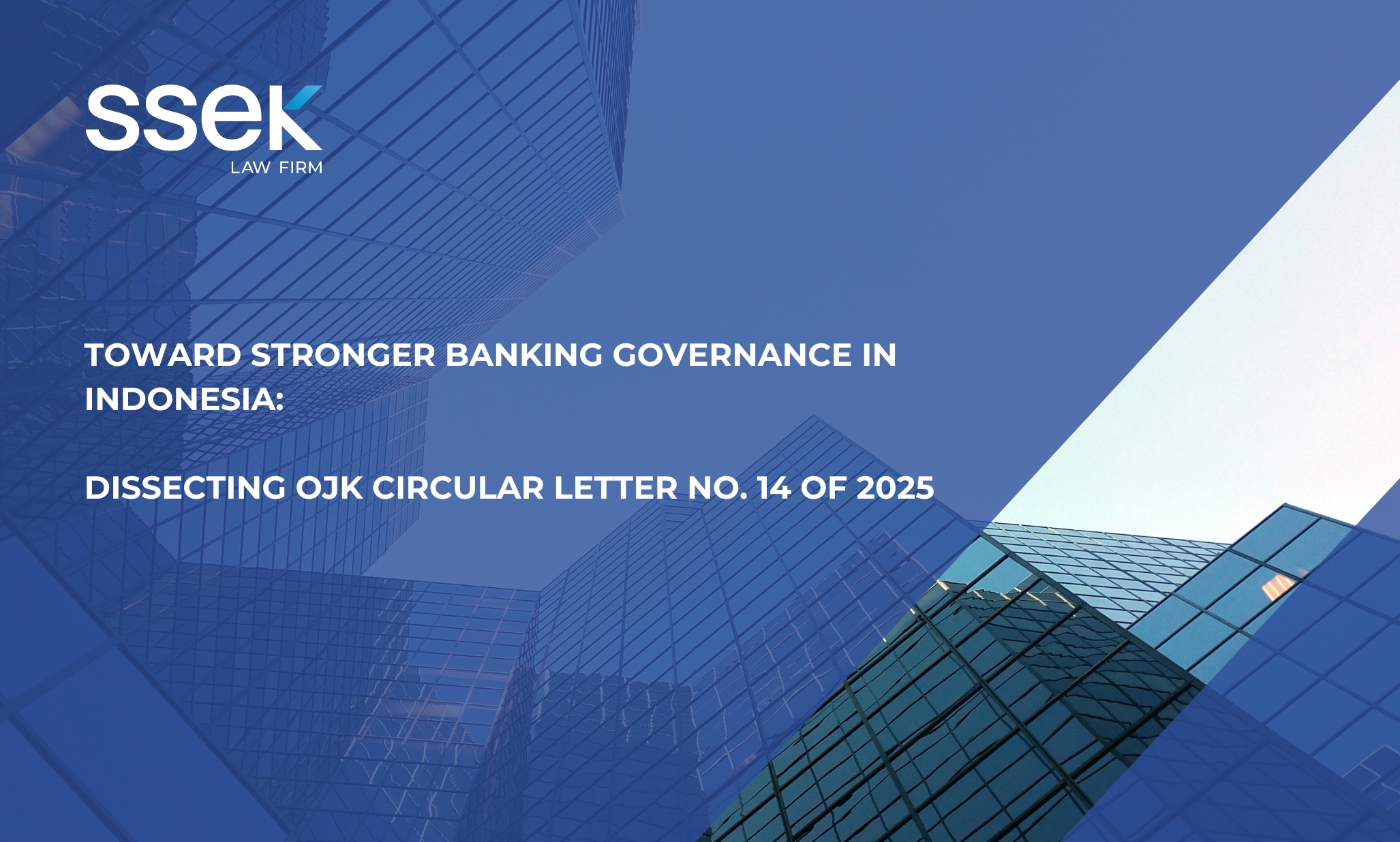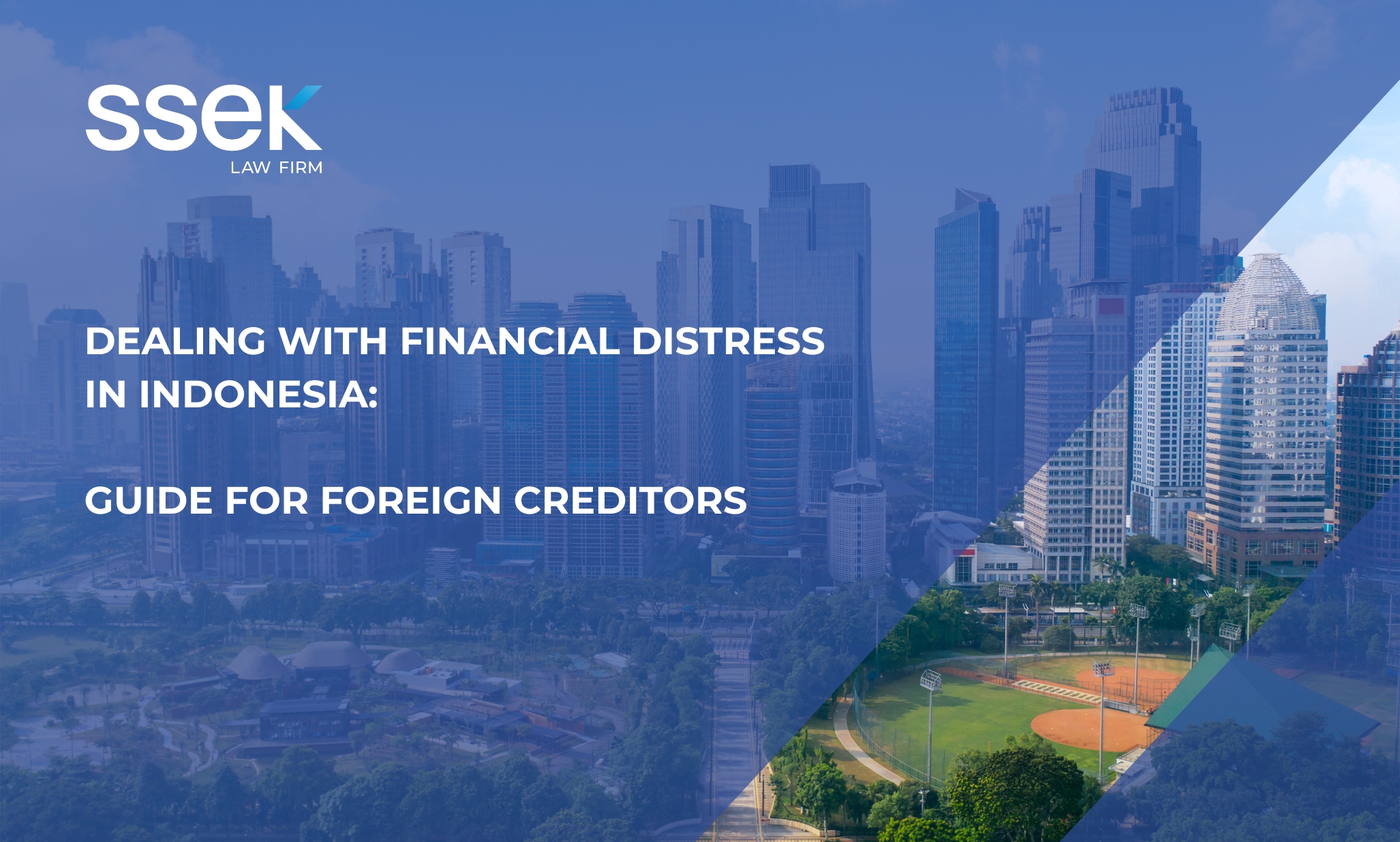


In an effort to strengthen the governance framework for commercial banks, Indonesia’s Financial Services Authority (Otoritas Jasa Keuangan or “OJK”) issued Circular Letter No. 14/SEOJK.03/2025 regarding the Implementation of Governance for Commercial Banks (“OJK CL 14/2025”) on June 24, 2025.
OJK CL 14/2025 supplements OJK Regulation No. 17 of 2023 regarding the Implementation of Sharia Governance for Commercial Banks (“OJK Reg. 17/2023”) and OJK Regulation No. 2 of 2024 regarding the Implementation of Sharia Governance for Sharia Commercial Banks and Sharia Business Units (“OJK Reg. 2/2024”). It further addresses the technical aspects of governance for banks, including conventional commercial banks, Sharia commercial banks, and Sharia business units.
This new circular letter revokes OJK Circular Letter No. 13/SEOJK.03/2017 regarding the Implementation of Governance for Commercial Banks (“OJK CL 13/2017”), Bank Indonesia Circular Letter No. 12/13/DPbS regarding the Implementation of Good Corporate Governance for Sharia Commercial Banks and Sharia Business Units, and Appendix II of OJK Circular Letter No. 10/SEOJK.03/2014 regarding the Assessment of the Soundness Level of Sharia Commercial Banks and Sharia Business Units.
By introducing more detailed and expansive requirements, OJK CL 14/2025 seeks to reinforce governance practices across the banking sector, ensuring alignment with the evolving complexity of the banking industry, as explained in greater detail below.
Refined Self-Assessment Factors for Good Governance Implementation
To ensure the implementation of the five basic principles of Good Governance in banks – transparency, accountability, responsibility, independence, and fairness – banks are required to conduct a self-assessment, which consists of several assessment factors. Under the previous framework, there were 11 factors as part of this process. However, the new circular letter sets out a more comprehensive approach by introducing 16 assessment factors, which are as follows:
- Implementation of the duties, responsibilities, and authorities of the Board of Directors;
- Implementation of the duties, responsibilities, and authorities of the Board of Commissioners;
- Completeness and implementation of committee duties;
- Handling of conflicts of interest;
- Implementation of the compliance function;
- Implementation of the internal audit function;
- Implementation of the external audit function;
- Implementation of risk management, including the internal control system;
- Provision of remuneration;
- Provision of funds to related parties and the provision of large exposures;
- Integrity of reporting and information technology systems;
- Bank’s strategic plan;
- Shareholder aspects;
- Implementation of anti-fraud strategies, including anti-bribery measures;
- Implementation of sustainable finance, including the implementation of social and environmental responsibility; and
- Implementation of governance in banking business groups (kelompok usaha bank).
Compared to the previous regime, OJK CL 14/2025 introduces six new assessment factors, as outlined above. These relate to remuneration, integrity of reporting and information in technology systems, shareholders, anti-fraud measures, sustainable finance, and the implementation of governance in banking business groups. OJK CL 14/2025 eliminates one assessment factor required under the previously framework, namely the assessment of transparency regarding the bank’s financial and non-financial conditions, governance implementation, and internal reporting.
In addition to the above, commercial banks and Sharia commercial banks with Sharia business units are now required to assess one additional factor: the implementation of the duties, responsibilities, and authorities of the Sharia Supervisory Board. This obligation was not mandated under the previous regulation, OJK CL 13/2017.
Key Amendments Regarding Commissioners
Unlike OJK CL 13/2017, which did not stipulate any requirements for candidates for the position of Independent Commissioner, OJK CL 14/2025 now stipulates that such candidates must possess adequate knowledge of the banking sector relevant to the role, as well as experience in the banking and/or financial sector. OJK CL 14/2025 also addresses the dismissal of members of the Board of Commissioners. Specifically, in the case of the dismissal or replacement of Independent Commissioners, banks are now required to obtain the OJK’s approval at least one month prior to the implementation of the General Meeting of Shareholders resolution regarding such dismissal or replacement.
In addition, the circular letter also provides that members of the Board of Commissioners are prohibited from holding certain concurrent positions in financial institutions, banks, and non-financial institutions.
Previously, under OJK CL 13/2017, the Board of Commissioners was required to notify the OJK within seven days upon identifying any violation of financial or banking regulations, or conditions (actual or potential) that could endanger the bank’s business continuity. This timeline has been shortened under OJK CL 4/2025, which requires notification to the OJK no later than five days from the identification of such findings.
Finally, in a change from the previous requirement that the Board of Commissioners hold at least four meetings per year, OJK CL 14/2025 now requires banks to hold at least one meeting of the Board of Commissioners every two months. Members of the Board of Commissioners are required to attend in person at least two Board of Commissioners meetings each year.
Key Provisions Introducing the Sharia Supervisory Board
OJK CL 14/2025 also introduces provisions regarding the Sharia Supervisory Board. Similar to requirements for the Board of Commissioners, the dismissal or replacement of members of the Sharia Supervisory Board requires the prior approval of the OJK, which must be obtained at least one month before the implementation of the General Meeting of Shareholders resolution concerning such dismissal or replacement. In carrying out its duties, the Sharia Supervisory Board is authorized to report directly to the OJK in the event of significant violations of Sharia principles, particularly those that may impact the bank’s financial condition and/or reputation.
Sharia Supervisory Board meetings must be held regularly, at least once a month, with a majority of Sharia Supervisory Board members in attendance. In addition, physical meetings involving all Sharia Supervisory Board members must be convened at least twice a year.
Strengthening Committees in Banks
OJK CL 14/2025 expands the requirements for committee formation within banks. Under the previous framework, only the Board of Commissioners was required to establish audit, risk monitoring, and remuneration and nomination committees.
The new regulation now also mandates that the Board of Directors establish at least the following committees:
- Risk management committee
- Credit or financing policy committee
- Credit or financing committee
- Information technology steering committee
Additional committees may be formed as needed, depending on the complexity and requirements of the bank.
The circular letter also introduces new requirements regarding the members of these committees, emphasizing the need for experts who possess a relevant competency certificate and at least five years of work experience in the relevant field.
Conflict of Interest Prevention and Management
Similar to the previous circular letter, OJK CL 14/2025 emphasizes the importance of preventing and managing conflicts of interest within banks. Expanding on previous provisions, the new regulation requires not only members of the Board of Directors and Board of Commissioners, Executive Officers, and controlling shareholders, but also members of bank committees, the Sharia Supervisory Board, and employees to disclose any conflict of interest in decisions where such conflicts arise. These individuals are also prohibited from taking actions that could harm the bank or reduce its profits.
OJK CL 14/2025 also stipulates that any transaction involving parties with special relationships must be carried out on terms no more favorable than those offered in transactions with unrelated parties. Specifically, OJK CL 14/2025 reaffirms and details the criteria for parties that are deemed to have a special relationship with banks, as follows:
- Parties that control or are controlled by the bank, including controlling shareholders and ultimate shareholders;
- Majority shareholders;
- Entities affiliated with the bank, including subsidiaries, sister companies, subsidiaries of sister companies, and special-purpose entities established by the bank or its affiliates;
- Members of the Board of Directors, Board of Commissioners, and Sharia Supervisory Board, and Executive Officers of the bank;
- Members of the Board of Directors, Board of Commissioners and Sharia Supervisory Board, and/or controlling shareholders of companies affiliated with the bank;
- Parties with influence over members of the Board of Directors, Board of Commissioners, and/or Sharia Supervisory Board of the bank;
- Parties with direct or indirect interests linked to individuals who control or are controlled by the bank; and
- Parties with familial relationships up to the second degree (both vertical and horizontal) with individuals who control or are controlled by the bank.
Additionally, still in relation to conflict of interest, OJK CL 14/2025 requires banks to establish policies and procedures governing transactions with parties that have special relationships with the bank. It specifies that such policies must include:
- A clear definition of parties with special relationships;
- The scope of transactions covered;
- The obligations of the Board of Directors and the Board of Commissioners in overseeing transactions with related parties;
- Processes for identifying related-party transactions and exposures;
- Guidance on the implementation of the arm’s length principle;
- Risk oversight mechanisms;
- Identification and prevention of potential conflicts of interest;
- Exposure limits for parties with special relationships; and
- Reporting mechanisms.
Additional Governance Provisions under OJK CL 14/2025
In addition to the key provisions discussed, OJK CL 14/2025 also provides further guidance on several other aspects of banking governance. This includes more detailed provisions on the implementation of the compliance function, internal audit function, and external audit function. The circular letter also reinforces the application of sound risk management practices and sets out expectations regarding the provision of remuneration, funds to related parties and large exposures, as well as the integrity of reporting and information technology systems.
It also addresses the governance-related obligations of shareholders, the implementation of anti-fraud strategies, sustainable finance, and governance within banking business groups.
Collectively, these provisions reflect the OJK’s emphasis on enhancing holistic and robust governance standards across all dimensions of banking operations.
Conclusion
The enactment of OJK CL 14/2025 reflects the OJK’s continued commitment to strengthening governance in Indonesia’s banking sector. By establishing more comprehensive requirements, especially in relation to the roles of organs such as the Sharia Supervisory Board and the various bank committees, the circular letter seeks to promote accountability, transparency, and resilience within banks. Moving forward, banks are expected to implement the standards set forth under OJK CL 14/2025 to ensure sound and responsible banking practices.
This publication is intended for informational purposes only and does not constitute legal advice. Any reliance on the material contained herein is at the user’s own risk. All SSEK publications are copyrighted and may not be reproduced without the express written consent of SSEK.









